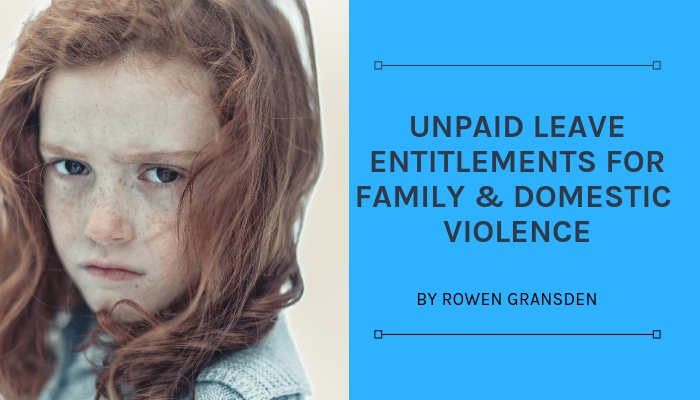
12 Sep Family & Domestic Violence Leave Entitlements
New family and domestic violence employee leave entitlements came into effect on 1 August 2018, following a ruling from the Fair Work Commission earlier this year. As a business owner, now is a good time to learn more about the new employee entitlements and review your workplace policies.
What is Family and Domestic Violence?
Under the new entitlement, family and domestic violence means “violent, threatening or other abusive behaviour by an employee’s family member that seeks to coerce or control the employee or causes them harm or fear”.
Who Is Eligible?
The new entitlements apply to employees covered by an Industry or Occupation Award. This includes casual employees. You can view the list of awards on the Fair Work Commission website.
There are some exemptions for employees under an enterprise award or state reference public sector award. However, these employees may be able to access paid or unpaid leave entitlements in their award if they are dealing with family and domestic violence.
What Are Employees Entitled To?
Eligible employees can take five days leave if they need to deal with the impact of family and domestic violence and it’s impractical to do so outside their ordinary hours of work. The five days renews each year but doesn’t accumulate from year to year if it isn’t used. Taking leave to deal with family and domestic violence issues doesn’t break an employee’s continuous service.
What Are Business Owners Entitled To?
Business owners can ask employees to provide evidence that they are dealing with a family and domestic violence situation. The evidence has to convince a reasonable person the employee is taking leave to deal with the impacts of family and domestic violence.
The types of evidence include:
• documents issued by the police service
• documents issued by a court
• family violence support service documents, or
• a statutory declaration.
If the employee doesn’t provide evidence, you are not obliged to grant them leave.
What Business Owners Should Do
1. Maintain Employee Confidentiality
Employers need to be mindful that family and domestic violence situations are sensitive. You should take practical steps to ensure information about your employee’s situation is kept confidential. This includes stating the reason why the employee is on leave. You can do this by talking to your employee and agreeing how the leave will be communicated within the business.
2. Review Your Workplace Policies & Contracts
In light of these new entitlements, now is a good time to review your workplace policies and contracts to state what entitlements employees dealing with family and domestic violence can access. If a workplace policy or contract provides less entitlement than the award, the entitlements in the award still apply.
3. Provide Information for Employees
You can also advise employees that confidential information, counselling and support for people impacted by domestic and family violence is available at the 1800RESPECT website, the national sexual assault, domestic and family violence counselling service.
To find out about more about eligibility and application of this ruling for your employees, please visit the Fair Work Commission website.



